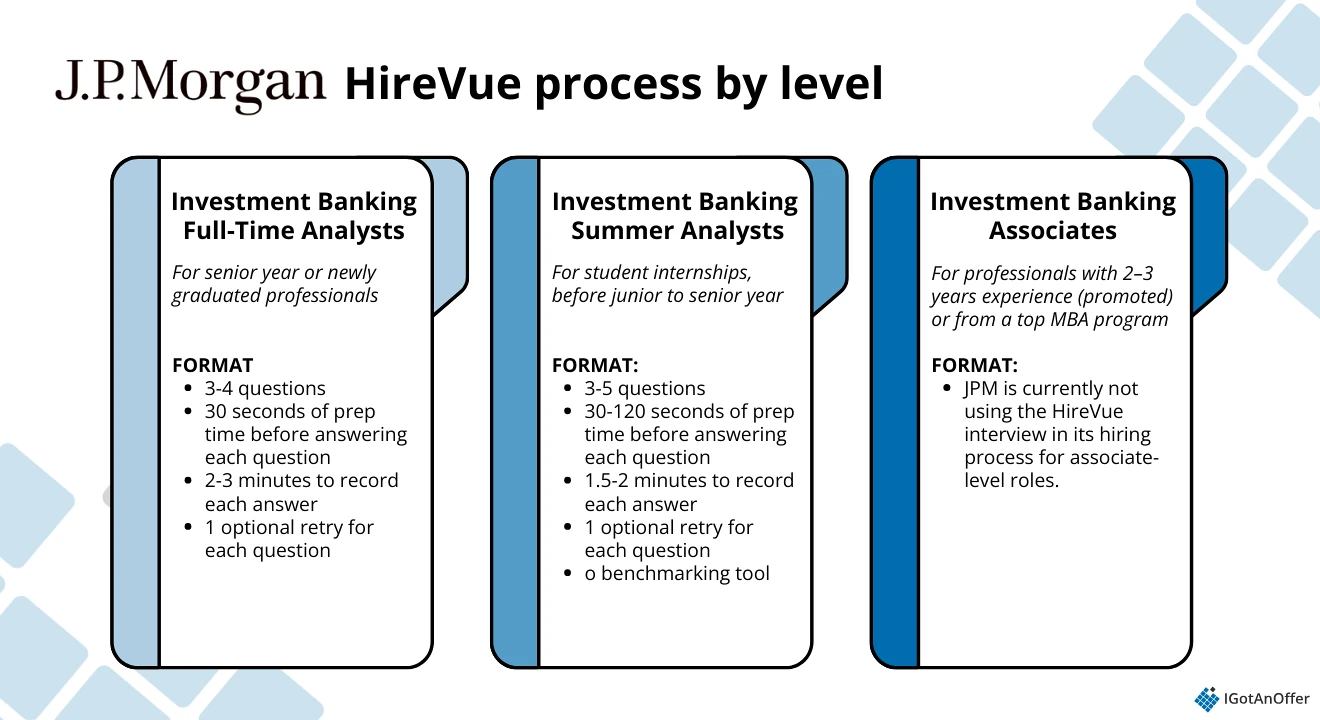Today, we’re going to demystify JP Morgan’s HireVue interview.
Use this guide to help you understand and ace the HireVue interview, then come back and use our free JP Morgan interview guide to prepare for the rest of the process.
Click here for a 1-on-1 resume review with an ex-investment banker
Let's dive in.
1. JP Morgan HireVue interview process
1.1 HireVue interviews defined
First, it’s worth briefly covering what HireVue interviews actually are, because they’re fairly unique.
HireVue interviews are asynchronous assessments where you record video clips of yourself answering interview question prompts. It's the screening round before the final rounds/Superday interviews ("Assessment Centre" in the UK).
HireVue uses artificial intelligence to grade a candidate based on the skills required for a given role and whether they are likely to succeed in that position.
In other words, HireVue is a “one-way” interview, where you’ll record yourself answering questions in front of your computer’s camera, instead of speaking with a real interviewer.
HireVue is a 3rd party software company, but when you do your HireVue interview for JPM it will be specific to the firm, and you may even get questions specific to the role you applied for.
It's worth mentioning that most applicants get a HireVue interview. The difficult part is getting to the next stage, and that will depend on both your performance in your HireVue interview and the strength of your resume.
With that in mind, we recommend that you make sure your resume is superb before applying to JP Morgan. If you'd like expert feedback on your resume, you can get help from our team of ex-investment bankers, who will cover what achievements to focus on (or ignore), how to fine-tune your bullet points, and more. You can also read our investment banking resume guide featuring a REAL example from a JP Morgan candidate.
Now let’s get into more of the specific logistics for JPM’s HireVue interview.
1.2 JP Morgan HireVue process by level
Below is an overview of the different HireVue interview formats by career level so you know what to expect.

Let's get into more detail.
1.2.1 HireVue process for Investment Banking Full-Time Analysts
We’ve analyzed Glassdoor data from real IB Analyst candidates at JPM and found that the current version of the corresponding HireVue interview has the following format:
- 3-4 questions
- 30 seconds of prep time before answering each question
- 2-3 minutes to record each answer
- 1 optional retry for each question
The questions are primarily behavioral questions. However, there are also technical and business sense questions in some cases.
The exact questions fluctuate because HireVue pulls questions from a pool of 100-150 possible questions.
We’ll give some specific examples of real questions that were recently reported in the questions section below. But first, let’s quickly cover the process for Summer Analysts.
1.2.2 HireVue process for Summer Analysts
According to the Glassdoor data we analyzed, the HireVue interview for Summer Analysts is slightly different and has the following format:
- 3-5 questions
- 30-120 seconds of prep time before answering each question
- 1.5-2 minutes to record each answer
- 1 optional retry for each question
As you can see, there’s a bit more variation in the exact format of the HireVue interview for Summer Analysts. Our advice would be to prepare for the most difficult format, and then you’ll be pleasantly surprised if your real interview varies in your favor.
For example, expect to only have 30 seconds of prep time before answering each question. Then, if you end up getting more time, it’ll just be a nice bonus for you during the interview.
1.2.3 HireVue process for Associates
If you’re applying for an Associate position, then good news! JPM is currently not using the HireVue interview in its hiring process for associate-level roles.
If you’re also preparing for other companies like Goldman Sachs and Morgan Stanley, check out our more detailed guide on investment banking HireVue interviews.
2. JP Morgan HireVue questions ↑
Below are several real HireVue questions from JPM Investment Banking Analyst and Summer Analyst interviews. Again, these are based on Glassdoor data. We’ve just rephrased the questions in some cases to improve the grammar or clarity.
Let’s get to the questions!
2.1 Investment Banking Analyst HireVue questions
For IB Analysts, JPM’s HireVue interview focuses heavily on behavioral questions. However, a few business sense and technical questions are also included.
Pay special attention to the three bolded questions at the beginning of the list, because these appear to be the most common questions on the current version of JPM’s HireVue interview.
IB Analyst HireVue questions
- Why JP Morgan?
- Tell me about a current event that will impact the financial markets
- Why investment banking / why this position?
- How are the 3 financial statements linked?
- Why is JP Morgan different from other banks?
- Tell us about a time you encountered a difficult client and how you handled the situation
- Tell us about a time you had to collect and analyze data
- Tell me about a recent achievement
- What's your career plan for the next 5 years?
- What is your greatest weakness?
- Tell me about a time you worked in a team
- When would it be favorable to perform an all-equity acquisition?
2.2 Summer Analyst HireVue questions
For Summer Analysts, you’ll still have a heavy focus on behavioral questions. There are also a few business sense questions in the mix. However, we haven’t seen any technical questions reported for this role’s HireVue interview.
With that said, you may still want to prepare for a few basic technical questions just to be safe. For example: “How are the financial statements linked together?”
Below are several example questions. Again, pay special attention to the bolded questions at the beginning of the list, because these appear to be the most common.
Summer Analyst HireVue questions
- Why JP Morgan?
- Why investment banking / wealth management / private banking?
- What markets are you currently following?
- Tell me about yourself
- How do you explain hard things to people who are new to them?
- Walk me through your resume
- Why are you the right candidate for this position?
- What's the most valuable advice that a mentor has given you?
- Describe a challenge that you have overcome
- What is your greatest accomplishment and why is it important?
- Pick an athlete that you see yourself in. Who is it and why?
- How will the recent tariffs on China impact trade deals?
3. How to prepare for your JPM HireVue interviews ↑
Okay, now that we’ve covered the logistics and common questions, let’s get into the steps you can take to actually prepare for the JPM HireVue assessment.
3.1 Prep answers to common questions
The first thing you should do is draft prepared answers for common questions.
The good news is that you already have a head start on this with the common questions we highlighted in the previous section.
We also have free guides that will help you craft high-quality answers to each type of question. Here are the guides:
- JPM behavioral questions guide
- IB behavioral & fit questions guide
- Business sense questions guide
- Technical questions guide
- IB interview accounting questions guide
- IB HireVue interview guide
- IB interview prep guide
3.2 Practice recording yourself
Once you have answers prepared, you should practice delivering your answers out loud.
After you can consistently communicate your answers out loud without referring to any notes or to your resume, then take things a step further by recording yourself.
The closer you can get to replicating the real conditions of HireVue, the more comfortable and better prepared you will feel. So, go all out. Wear the clothes you plan to wear for the HireVue interview and time yourself to make sure you’ll finish before the time cut-off.
Then watch the video footage and look for opportunities to improve upon your answers and delivery.
However, it is tough to objectively evaluate your own answers. That’s where the next step comes in.
3.3 Get feedback on your answers and delivery
Finally, it can be extremely helpful to get someone else to give you feedback on your answers.
Feel free to start by asking your friends or family, as they can probably catch some communication mistakes that you didn’t notice.
However, feedback from people outside the industry will only go so far, because they may not know exactly what a great answer looks like. That’s why it can be a huge advantage to get feedback from ex-interviewers from JPM or other leading banks.
Sure, it can be tough to connect with someone from a top bank, but here’s the good news: we’ve already made the connections for you! Check out our interview coaching service, where you can practice interviewing and get feedback on a live call with JPM ex-interviewers. Click here to learn more.















